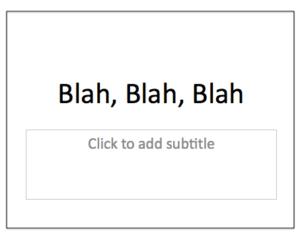 Any time I join a meeting and see dull black text projected on a plain white background, a little piece of my soul dies.
Any time I join a meeting and see dull black text projected on a plain white background, a little piece of my soul dies.
Word slides are the worst. Not only are they proven to be ineffective, but they imply that you may be out of touch and behind the times. Which is a terrible position for any business leader to be in.
In fact, I’d go as far as to say that the word-filled slide is the presentation world’s equivalent to two spaces after a period.
I know, I know! You could line up an army of passionate supporters for two spaces, just as I could present evidence from graphic design professionals showing why it’s wrong.
But the bottom line is this: ageism exists. And just as two spaces after a period suggests a an early era when many of us toiled away in typing classes on our IBM Selectrics, the dense, wordy slide says something just as clear. It says you’re not keeping up with the times.
TED Talks Have Changed the Landscape
TED Talks have dramatically changed audience expectations for what a presentation should be. As a result, the bar has never been higher for presenters of every kind, from professional speakers to everyday PowerPoint users.
TED Talks reflect three changes in particular:
- Audiences expect presentations to be shorter and more focused. When I started writing speeches for corporate executives 20 years ago it was not unusual to put together a 45-minute presentation. Recently I worked on a conference where we had 90 minutes for the opening session and filled that time with 20 different speakers — on stage, on video and via panel discussion.
- People want to be entertained. It’s not enough these days just to inform an audience. They want drama, passion, story — everything they see in TED Talks. As a speaker I’ve found the vetting process for presenters becoming more and more strict. Conference organizers want references, they want to see video, they want to inspect your slides. Some even appoint coaches to hold presenters’ hands through the process. To coin a term from the theater world, they want speakers who can get “butts in seats” … and keep them there.
- They expect more elegant, evocative visuals. People don’t come to a presentation to read; they come to watch you present. Do what TED Talkers do — put the words in your mouth and put pictures on the screen.
By the way, TED Talks didn’t invent this style. Steve Jobs was doing it for years. And Seth Godin issued a powerful manifesto on the subject over a decade ago. But in spite of all the evidence, Death by PowerPoint persists.
Why Word Slides Don’t Work
We all grew up understanding that a picture is worth a thousand words. But that’s more than an aphorism; it’s actually supported by science. According to the picture superiority effect, images trump words.
And studies have shown that wordy slides contribute to cognitive overload. The audience is forced to choose — read or listen— and they can’t do both without missing the message. So instead of enhancing audience understanding, word slides actually hinder it.
What’s the Solution?
The good news is, you don’t need to be a graphic design professional to create better, more visual slides. With a few tips, anyone can do it.
In fact, here’s a simple tutorial that helped me immensely.
The most important piece of advice is this: make each slide about one idea only. Not two ideas, not three ideas — just one. Then find a single, evocative visual to underscore that idea.
Yes, that means more slides. But to keep an audience’s attention these days, presentations have to move. They have to be brisk. They need forward momentum.
Help Put an End to Death by PowerPoint
Try doing this for your next presentation and you’ll notice something amazing happens. Suddenly your audience has gone from sitting back and passively reading to leaning forward and actually engaging with you. Now they’re focused on your delivery, your passion, your content.
It can be scary to throw away the security blanket of word slides. But the rewards are huge. Few things in business are more important than the ability to present your ideas in clear and compelling terms.
A great presentation can help you win new business, gain approval for programs and budgets, rally a team around a goal and enhance your reputation in the industry.
So get on board. Let’s work together to stamp out Death by PowerPoint once and for all!
[A version of this post originally ran on IABC’s Content World]
